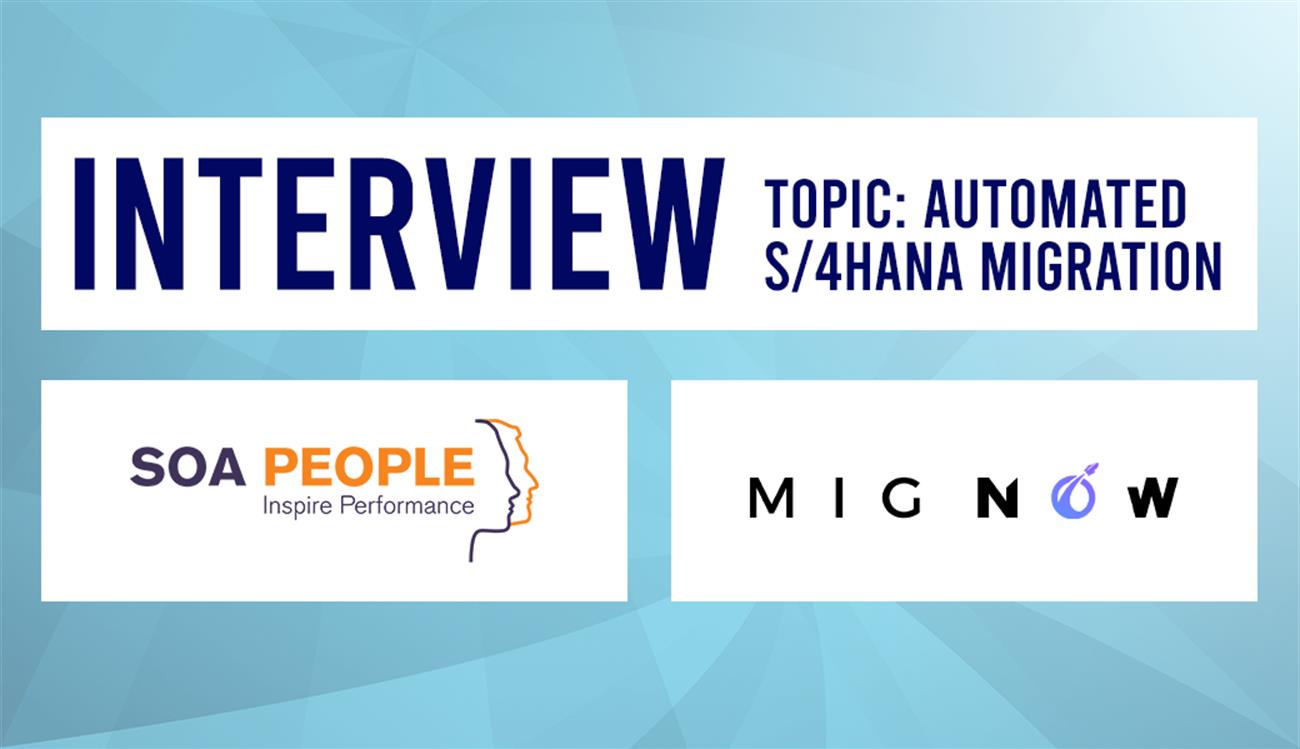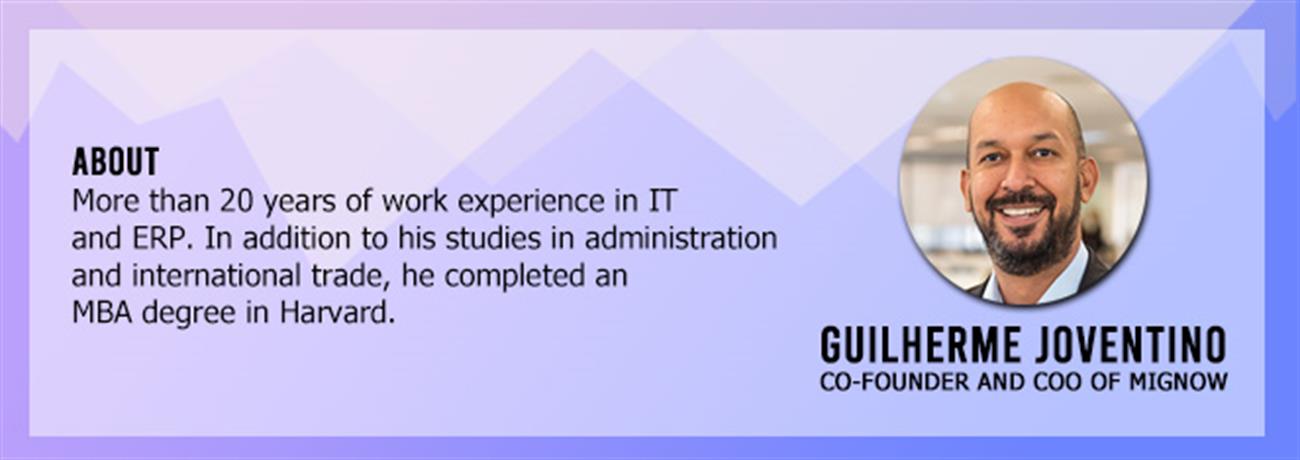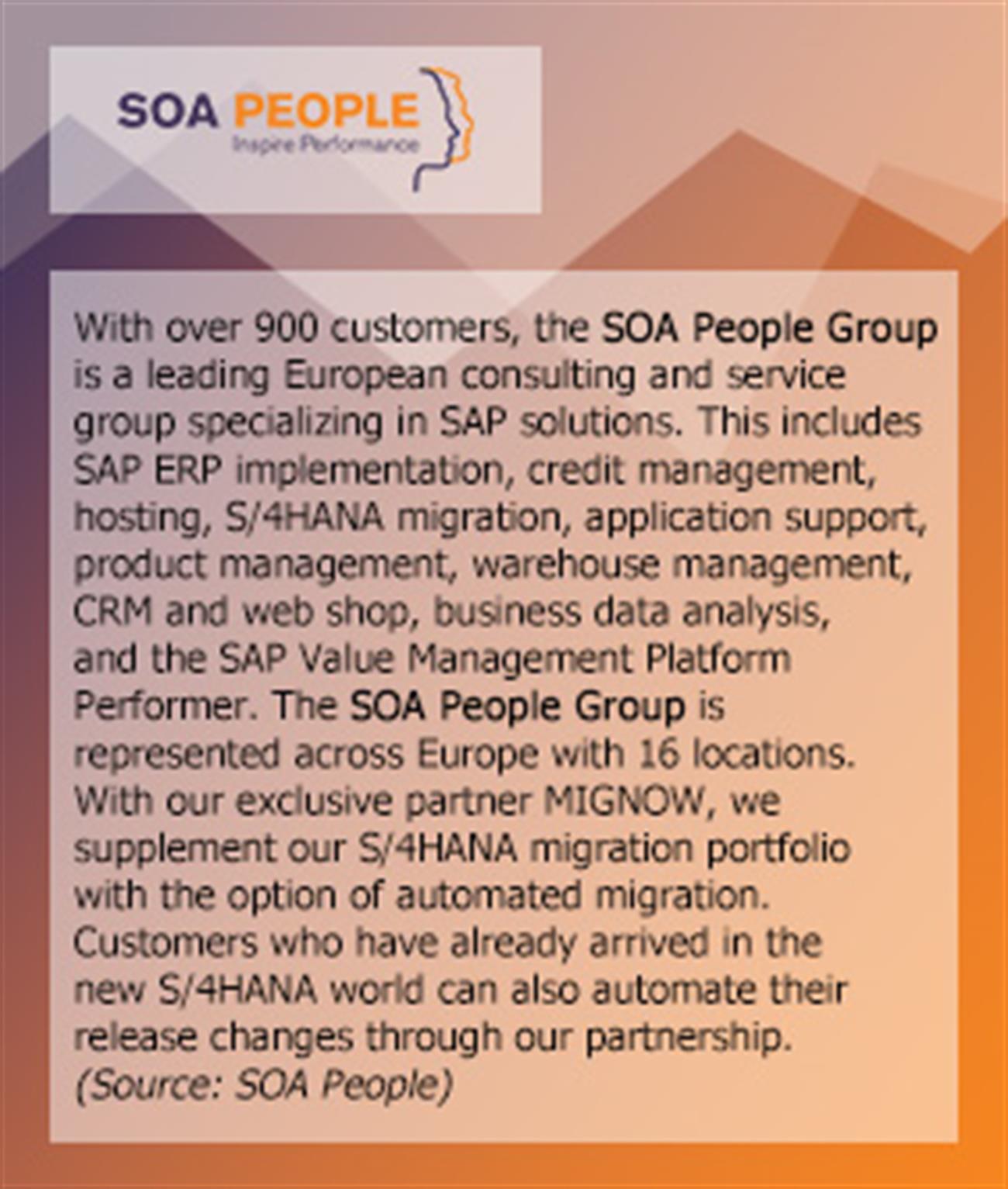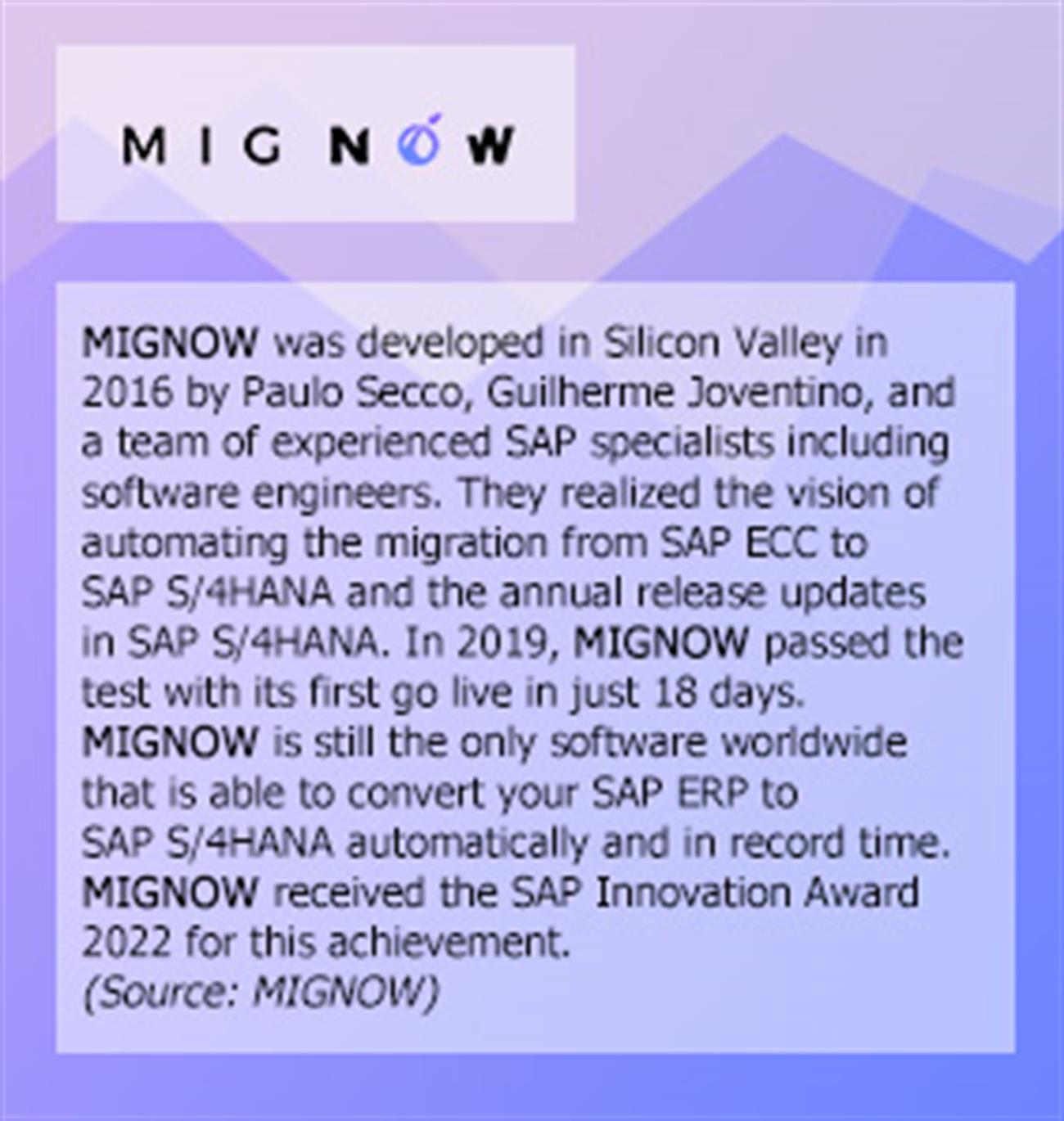 With the release of S/4HANA, SAP also announced that
it would phase out the support for older ERP versions of SAP ECC by
2027. For numerous SAP customers, this means a fundamental change of their
core system. Although the migration to the promising SAP S/4HANA system offers
some advantages (e.g., simplicity, user-friendliness, and security), many companies
and decision-makers are concerned about the effort (e.g., time, money, and
resources) that should not be underestimated. SOA People, together with its
partner MIGNOW, has found a way to accelerate S/4HANA migration and
transformation projects, minimize labor-intensive processes and thereby save
time, costs, and effort. Dr. Tamas Szirtes (Group Innovation Director at SOA
People) and Guilherme Joventino (Co-Founder & COO of MIGNOW) explained to
us how this works for SME and large corporations.
With the release of S/4HANA, SAP also announced that
it would phase out the support for older ERP versions of SAP ECC by
2027. For numerous SAP customers, this means a fundamental change of their
core system. Although the migration to the promising SAP S/4HANA system offers
some advantages (e.g., simplicity, user-friendliness, and security), many companies
and decision-makers are concerned about the effort (e.g., time, money, and
resources) that should not be underestimated. SOA People, together with its
partner MIGNOW, has found a way to accelerate S/4HANA migration and
transformation projects, minimize labor-intensive processes and thereby save
time, costs, and effort. Dr. Tamas Szirtes (Group Innovation Director at SOA
People) and Guilherme Joventino (Co-Founder & COO of MIGNOW) explained to
us how this works for SME and large corporations.
erp4students:
Hello and thank you for taking the time to answer our questions. How are you
and where are you currently?
 Dr. Tamas
Szirtes:
Dr. Tamas
Szirtes: Thanks for the invitation to share SAP insights with you and the erp4students community. I am fine and currently working from home. This allows me
to join, for example, a steering committee meeting in Belgium, an internal call
with French colleagues and an alignment with our German sales team. No surprise,
several of these calls are related to our exclusive partnership with MIGNOW, today’s
interview topic.
 Guilherme
Joventino:
Guilherme
Joventino: Thanks for the invite. Right now, I am traveling a lot to speak with
people from the SAP community here in Europe. I just left Barcelona where I
attended a meeting with SAP together. Now, I am with SOA People at the
convention USF 2022 in Lyon, France. A few days later, you can see me already
at the Performance Day organized by SOA People in Zandvoort, a small Dutch city
close to Amsterdam. In-between, I am available for phone calls and customer
meetings. I simply want to make the most out of the time here in Europe,
working closely together with SOA People and SAP.
erp4students:
Before we get to the core topic of this interview: What moved you to deal with
the topics of IT, business and, more specifically, SAP and consulting?
Guilherme: I am a
very curious, restless person that likes to continuously learn and improve
things. As a student, SAP technologies appeared to me as a promising
opportunity where I could have an impact. I thought, this industry needs and
searches for people like me that want to find new innovative ways in looking at
things and that push the boundaries of what is possible in business and IT. Since
my first SAP work experience as key user until today, so much has happened. In
hindsight, I am very happy I had made the choice back then to start with SAP as
a student.
Tamas: Right
from my studies, I was interested in the crossroad of business and IT. Since I
was in Germany, you can imagine, it was almost inevitable to stumble upon SAP. Businessmen
from all kind of industries talked about SAP and its growing capabilities as ERP
system and beyond. I am glad to have joined the SAP world. You can learn so
much while providing value to so many different customers. It simply does not
get boring as there is always change. As Director of Innovation at SOA People,
it is now fully official that my job (and passion) is to continue striving
forward and to find the best solutions and innovations for our customers.
erp4students:
SOA People is a company with its headquarter located in Wavre, Belgium, and
MIGNOW is a Brazilian company. How did you meet and how did the collaboration
come about?
 Tamas:
Tamas: We were
looking for solutions to bring the migration to S/4HANA on a new level for SME and large enterprises. By
scanning the global market, we have identified MIGNOW as the most interesting
solution by far. I directly contacted Guilherme and this is how our journey
started. Today, approximately three years later, the two companies are working closely
together and I have no days without talking to someone from MIGNOW.
Guilherme: Yes,
exactly. MIGNOW was already having the first successes in Brazil and I was
asking myself how to make this technology also globally available for SAP
customers. When Tamas reached out to me, I was very happy. After sharing more
what we are doing, we could see how we can complement each other and quickly
became partners.
erp4students:
The move to S/4HANA comes with enormous challenges for many companies - but
what do you think are the advantages that the new system brings with it? Guilherme: I
believe that SAP S/4HANA, which is SAPs fourth ERP suite, developed by SAP
itself, is the most successful ERP system. It enables organizations to work
seamlessly in a digital economy. Companies benefit from its simplification and
centralization for management and administration, the ease of use, resource
savings, innovation, improved performance and speed. Plus, over 1450 new
features released, illustrate how much SAP is continuously moving forward.
Tamas: Yes,
exactly. Companies running on SAP S/4HANA can be more agile, work mobile and
flexible, increase productivity, improve business performance and… to become
insight-driven by having real-time data access!
erp4students:
With MIGNOW, you offer a solution that accelerates migration and transformation
projects (to S/4HANA) and minimizes labor-intensive processes - and does so
automatized. How does MIGNOW, as a software product, work?  Guilherme:
Guilherme: MIGNOW
is a technology startup that owns the software of the same name. The software
is approved by SAP for the automation of conversion processes to S/4HANA and
upgrades within S/4HANA. The automation capabilities of MIGNOW
drastically speed up decision making in the conversion processes by identifying
SAP adjustment points, using SAP conversion tools, based on SAP best practices
as well as knowledge acquired in the various conversion processes carried out
by us. The rather standardized, big chunk of ABAP codes can be converted automatically,
leaving only a minor work effort to be done manually by consultants. On top, we
hugely accelerate the processing of the relevant simplification items and give Fiori recommendations based on user history.
Tamas: Here, I
would like to give an example. One of our first migrations together with MIGNOW
was Galler, a growing Belgian confectionary company. Within only 3 months, they
were successfully migrated at low cost and without any disruption to the
business. With S/4HANA, Galler benefits now from the latest technology,
including embedded analytics, real-time data and the Fiori user experience.
erp4students: The MIGNOW way seems predestined for the brownfield
approach, in which, among other things, past customization investments are
preserved. A disadvantage, however, is that old structures are often
"carried along" and it poses the risk that previous inefficiencies might
be also taken over. In addition, a later switch to the SAP S/4HANA Cloud seems
to involve considerable effort. How does MIGNOW counteract these difficulties?
Guilherme: Yes,
exactly. A brownfield migration refers to upgrade the existing SAP landscape
from SAP ECC to SAP S/4HANA while leveraging legacy components. With
brownfield, you have the chance to reevaluate and edit existing work processes
and only port over relevant ones. As you said, it is a lot of work to check on
every single custom code object in sufficient detail to make sure that only
necessary, beneficial work processes are taken over to SAP S/4HANA system. This
is where MIGNOW comes in. It is AI-driven and can automatically analyze the
whole custom code based on best practices. This saves a tremendous lot of time,
reduces errors meanwhile giving the opportunity to focus on more complex custom
code objects. On average, we have experienced that the deployment of MIGNOW
reduces 95% of manual work effort in a Brownfield migration.
A great example for the impact of MIGNOW is our customer and biggest
Brazilian retailer Carrefour. We were facing a very complex situation with
almost 19.000 custom code objects. As typical for Brownfield migrations, 60% of
Carrefour‘s custom code objects were outdated or could be taken to S/4HANA
without any changes. The remaining 40% of custom code objects supposedly needed
to be manually adapted. Correction and testing take around four hours per
object, resulting in around 30.400 hours manual work effort with a classical
Brownfield approach. By automating the migration with MIGNOW, only 0,7%, so 135
custom code objects were left to be manually modified. As such remaining
objects tend to be more complex, we calculated 12 hours per object, effectively
boiling down the amount of manual work to less than 1.600 hours instead of the original
30.400 hours.
Tamas: Yes,
this drastic reduction of manual work effort with MIGNOW is unique. Also, SAP
has recognized this outstanding automation capacity by awarding MIGNOW with the
SAP Innovation Award 2022 in the context of the Carrefour business case. Only
with MIGNOW, for Carrefour it was possible to migrate and move to their new
data center within only 3.5 months. Details such as Carrefour benefiting from
five times more speed to deploy new functionality, makes us even more proud to
work as partners together.
Guilherme: However, not
every company is suitable for a Brownfield approach as not every company should
complete the migration all at once in a „big bang“ or copy large amounts of
transactional and master data. The alternative is then the selective or empty
shell approach where a copy of the existing SAP ECC system is created that does
not contain any master and transaction data. Therefore, we have an empty
system, hence called „empty shell“. In an empty shell scenario, companies can
significantly speed up their conversion with MIGNOW. By automating the
migration of valuable custom code objects, the company can continue to benefit
from it in the new system.
Tamas: Coming
back to your last point in your question being on S/4HANA greatly simplifies a
further move to the Cloud. It is even possible to use MIGNOW for a lift and
shift approach where you migrate to S/4HANA and move to a private cloud at the
same time.
erp4students: A Greenfield approach
stands for a completely new start with SAP S/4HANA on a Greenfield site. When
do you recommend companies to choose this approach? Do you provide with MIGNOW
the possibility of an AI-supported new implementation or which alternatives can
you offer next to Brownfield? Guilherme:
Especially companies that need to reduce their complexities as they have
amassed heavily customized workflows and code, should choose Greenfield. With
Greenfield, they have the chance to set up a clean, new system from scratch,
where they can reengineer their SAP processes and workflows, all based on best
practices. As there is no custom code, master or transactional data migrated,
MIGNOW is not applicable.
Tamas:
Independently from our partner MIGNOW, we have a whole S/4HANA migration
portfolio addressing companies also considering the Greenfield approach. For
example, we can do a digital transformation workshop to discuss individually
about strategy and IT design. For our customers, we carry out business process
reengineering in S/4HANA Assessment Workshops. We can furthermore harmonize
business processes based on best practices with our prequalified,
industry-specific packages. Together with our customers, we also discuss the
various deployment options, where they can decide between on premise, our
hosting offering or the cloud. Overall, we simply focus on being their
strategic partner guiding them through crucial decision-making and
implementations on their digital transformation.
erp4students:
Companies have apparently many complex choices to take, depending on their
business needs and strategy. Can you see a trend how many companies are
choosing for Greenfield, Brownfield or Selective? Tamas:
Overall, we can observe from our own experience that the vast majority of
companies decide for a Brownfield or Selective approach. This observation I
could further validate by conversations with SAP employees, partners as well as through
surveys from e.g. the German-speaking SAP usergroup DSAG. They are all talking of roughly 25 percent of companies
choosing Greenfield. Recently, I was reading a report of Deloitte about SAP
Integration this year where they stated that even less, only 20 percent of
their customers, have opted for Greenfield. This further illustrates that the bigger
and more complex a company is, the more it tends to choose the Selective or
Brownfield approach.
Guilherme: Yes,
exactly. Successful companies with a longstanding SAP system simply do not want
to lose all their legacy customizations and coding while still embracing the
newest SAP innovations. Furthermore, it costs and takes even more time to fully
reinvent yourself. So why not continuing to rely on some well-proven work
processes? The strength of SAP to enable the handling of complex matters becomes
a challenge, of course. On their move to SAP S/4HANA, this should never be
underestimated. However, that is why we have developed MIGNOW. For our
customers, we are the key to accelerated, resource efficient Brownfield and
Empty Shell conversions.
erp4students:
Many companies and especially their employees value contact with trained
specialists during and after a migration, transformation, or implementation
process. How can one imagine the support in the context of an automated and
AI-supported migration? Tamas: The
support is not done by a machine. That is why we are partner of MIGNOW. We
provide locally the necessary access to and support with the software here in
Europe. As we are located in many different countries, we can assist in various
local languages and make sure that the automated migration is carried out
smoothly. Customers need someone who can be there for them right on the spot,
if needed.
Guilherme: I fully
agree with you, Tamas. The MIGNOW software is powerful because of its automation capacity and AI. This, however, does not undermine human interaction but rather allows
more space for it. Like in normal S/4HANA migrations, SAP Partners like SOA
People provide support by e.g. having employees answering open tickets, giving
workshops for key users or whole departments and to guide with their expertise
during decision-making processes. We believe that humans should be there for
each other and machines and software only simplify this interaction such as
MIGNOW does by significantly reducing manual work efforts, leaving more time to
discuss about more valuable, strategic topics. Like this, being there for each
other, we treat every customer.
erp4students: From 2027, support for older ERP
versions will be discontinued. What is your advice to companies that are still
undecided about which approach (greenfield or brownfield) is right for them? Tamas: Since
2015, the birth of S/4HANA, we have received this question many times and have developed
a methodology to answer it. We run a number of technical and functional
assessments in a few days’ effort and at the end of this exercise, we give a
clear answer about the approach (greenfield, brownfield or selective), but also
about target architecture, data management, project timeline, budget estimate,
organizational impact, change management, etc.We cover all aspects that decision makers need to know. Based on these
insights and the company’s strategic objectives, they can then take the right
decisions for the future of the company.
Guilherme:
Brownfield and the selective approach tend to be quicker than Greenfield as you
do not need to start everything new from scratch. With MIGNOW, the manual work
efforts and therefore time can get even more reduced, meaning that Brownfield
and Selective are becoming significantly quicker options compared to
Greenfield. Considering that there are limited resources available to migrate,
companies do need to think not only about their digital transformation itself
but also what is feasible at which cost. If they do not migrate soon, they run at
risk to be without SAP mainstream maintenance with SAP Business Suite 7 core
applications from beginning 2028 onwards. Meanwhile, they have to keep in mind
not only their own limitations of internal resources but also what resources
are available at SAP and its partners. In this context, I believe that MIGNOW
is getting even more attractive beyond its actual value proposition as only
with MIGNOW you can migrate accelerated amid scarcity of resources.
erp4students: How would you convince companies
that work with 15+ year old SAP systems and believe that such old systems and
data cannot be migrated and therefore tend to start over with another provider
(other than SAP)?
Tamas: SAP
has accumulated so much experience and knowledge about the requirements and complexities
of companies while providing solutions to ensure compliance with legal
frameworks worldwide that this should not be underestimated. Other ERP
providers have a genuine challenge to keep up with what SAP and its strong
partner network has to offer. Also, it has become fully clear that it is
possible to migrate from SAP ECC to S/4HANA. Thousands of companies around the
world have done this already successfully. We have done it many times, too. Companies
on S/4HANA benefit from the newest innovations and get more agile. Considering
all the challenges that they have to face, especially nowadays, running on SAP S/4HANA
is definitely a huge competitive advantage.
Guilherme:
True. Especially when you have complex company structures and requirements, SAP
has proven to be the right choice. With S/4HANA, SAP is revolutionizing itself again.
We are right now part of a new era of digital transformation and innovation.
SAP genuinely invites and incentivizes not only its own employees but also the
whole partner community to work daily on the mission to develop and provide the
best solutions possible for its customers. Therefore, I recommend every company
running on an outdated SAP ECC to have an open-minded look at what awaits them
in S/4HANA. Without knowing what capabilities, features and user experience
they can have, I doubt they can take the strategically right decision for the
future company IT landscape. Also, being afraid from the conversion itself,
should not be the critical reason why a company would consider other ERP
systems. That is also why MIGNOW exists: to SAP customers, we offer a unique opportunity
to simplify and speed up their migration.
erp4students: Since you have been working in the
IT and SAP area for years: What are your tips and tricks for young graduates
who also want to work in this area? Guilherme:
Are you interested in topics such as ML, neural networks and automation? When
you love learning, trying out new things and, additionally, you are always
determined to excel, then IT and SAP could be something for you. It is a very
fast paced, dynamic environment. Stay naturally curious. Engage with inspiring
people and let them guide you. Broaden your horizon. Focus on the customer.
Understand their problems and processes. The moment you disagree with a person
about a business process or a business process is simply too complex, ask
yourself why. Are there existing already better solutions? If not, what could
be a better way? That is the moment where you might be close to an innovative
idea!
Tamas: To
advance most quickly in IT and SAP, I advise to join a consulting firm. The learning
curve is much steeper there. Young professionals can progress faster in their
career. I personally think thatthe best choice is a company which is not too
small and not too big. Big enough to be impactful, but small enough to be
personal.
Thank you very much for answering the questions and I
wish you all the best for the future. Kind regards and stay healthy.
More Information:
» Website SOA People » Website MIGNOW